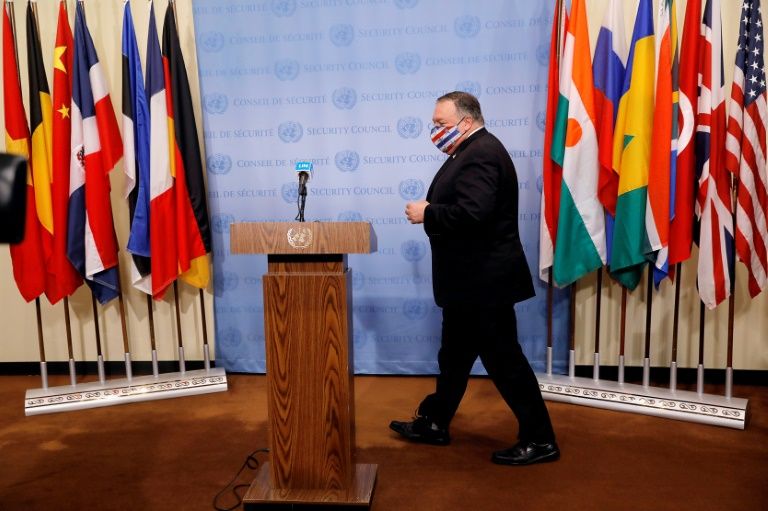Iran sanctions: US versus the world over ‘snapback’ option
US Secretary of State Mike Pompeo on August 20 2020, after demanding that UN sanctions on Iran be resumed. ©POOL/AFP/File MIKE SEGAR
Washington (AFP) – The United States will unilaterally declare this weekend that UN sanctions against Iran are once again in force, a move that risks increasing Washington’s diplomatic isolation while also stoking international tensions.
“Virtually all UN sanctions on Iran will come back into place this weekend at 8:00 p.m. Eastern Time (midnight GMT) on Saturday the 19th,” said Elliott Abrams, the Trump administration’s special representative for Iran.
But on this point, Washington is almost alone in the world: all the other great powers — China, Russia and also the US’ own European allies — have challenged the claim.
How did the UN arrive at this spectacular stand-off between the leading superpower and the rest of the planet? To answer that, one has to go back at least one month.
In mid-August, President Donald Trump’s administration suffered a resounding defeat at the UN Security Council when it tried to extend the embargo on conventional weapons being sent to Tehran, which was due to expire in October.
Secretary of State Mike Pompeo made an unusually vehement attack on allies France, Britain and Germany, accusing them of “siding with Iran’s Ayatollahs,” and on August 20 announced a controversial move known as the “snapback,” which aims to re-establish all sanctions against Tehran a month later.
The sanctions were lifted in 2015 when Iran signed on to an international agreement not to seek to build nuclear weapons.
– A legal pirouette –
But Trump said that the landmark accord, negotiated by his predecessor Barack Obama, was insufficient and withdrew the US from the agreement in 2018, then renewed and even strengthened Washington’s bilateral sanctions.
At the moment, the United States is insisting it is still a participant in the agreement that it stormed out of, but only so that it can activate the “snapback” option.
Virtually every other member of the Security Council disputes Washington’s ability to execute this legal pirouette, and the council has not taken the measure any further.
But this dialogue of the deaf has gone on unabated: the Trump administration acts as if the international sanctions were coming back, while the rest of the international community continues to act as if nothing has changed.
So is this a symbolic gesture designed to recall Washington’s hard line against Tehran, or are there more concrete measures in the offing?
The Americans will “pretend that they have activated the snapback and that therefore the sanctions are back up and running,” said one European diplomat. But “this action will have no legal foundation” and therefore “cannot have legal consequences.”
“I don’t see anything happening,” said another UN diplomat. “It would be just a statement. It’s like pulling a trigger and no bullet coming out.”
– Trump ‘shock’? –
Another diplomat deplored the “unilateral” US act, saying that “Russia and China are sitting, happy, eating popcorn, watching” the “huge destabilizing fallout” between Washington and its European partners.
The US is, however, demanding that the arms embargo be prolonged “indefinitely,” and that numerous other activities linked to Iran’s nuclear and ballistic programs be subject to international sanctions.
Pompeo said this week the US will “do all the things we need to do to make sure that those sanctions are enforced.
“We are going to act in a way — and we have acted in a way — that will prevent Iran from being able to purchase Chinese tanks and Russian air defense systems,” he said
“We expect every nation to comply with UN Security Council resolutions — period, full stop,” he added.
That is where the issue risks stoking up international tensions.
Trump could announce secondary sanctions to punish any country or entity that violates UN sanctions, blocking their access to US markets and financial systems, even though the US is one of the only countries to believe that the sanctions are actually in force.
Six weeks away from possibly winning a second term, the US president could also use his Tuesday address to the General Assembly to “try and create a shock by announcing some sort of financial penalty on the UN because of his dissatisfaction over the snapback process,” said Richard Gowan of the International Crisis Group.
Disclaimer: Validity of the above story is for 7 Days from original date of publishing. Source: AFP.


